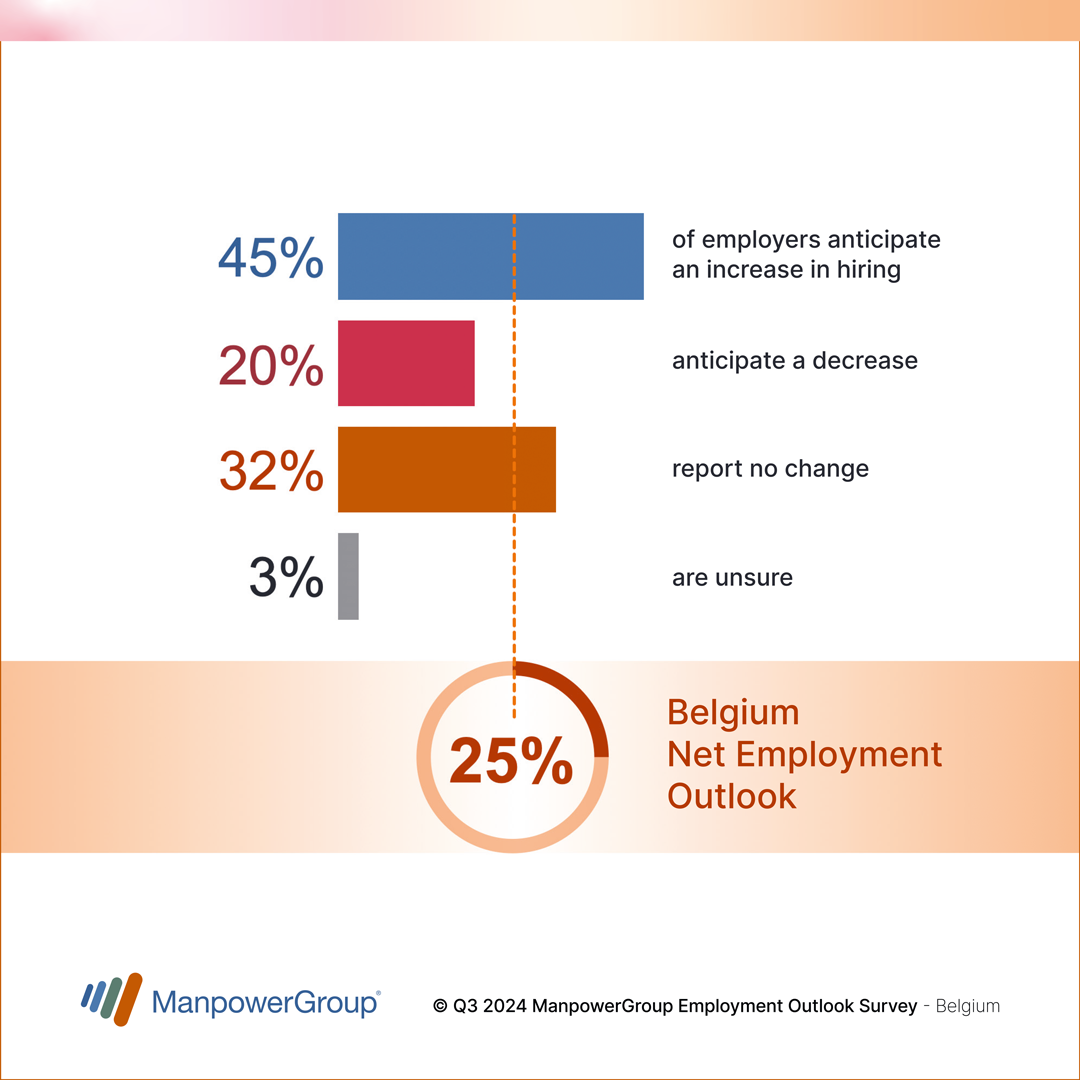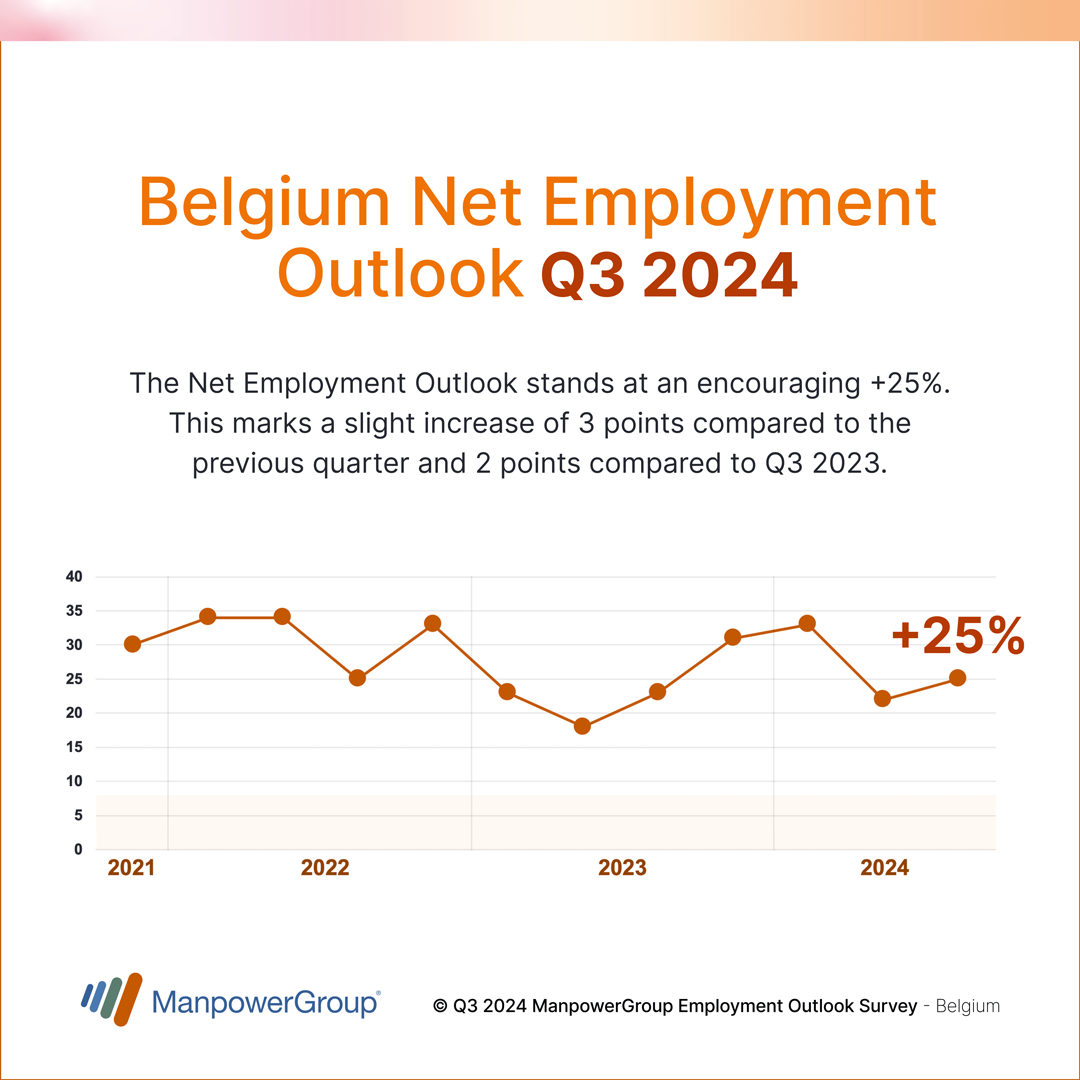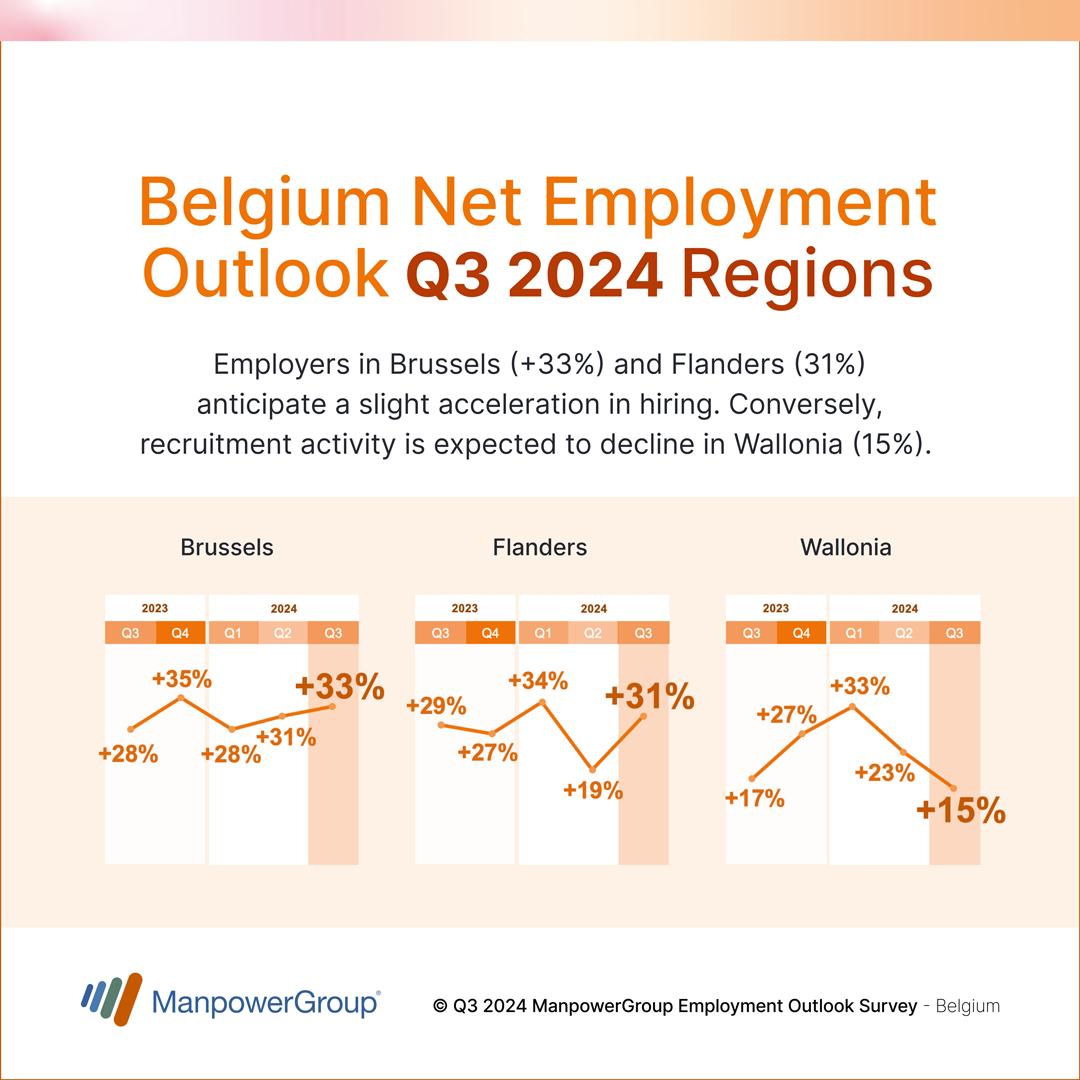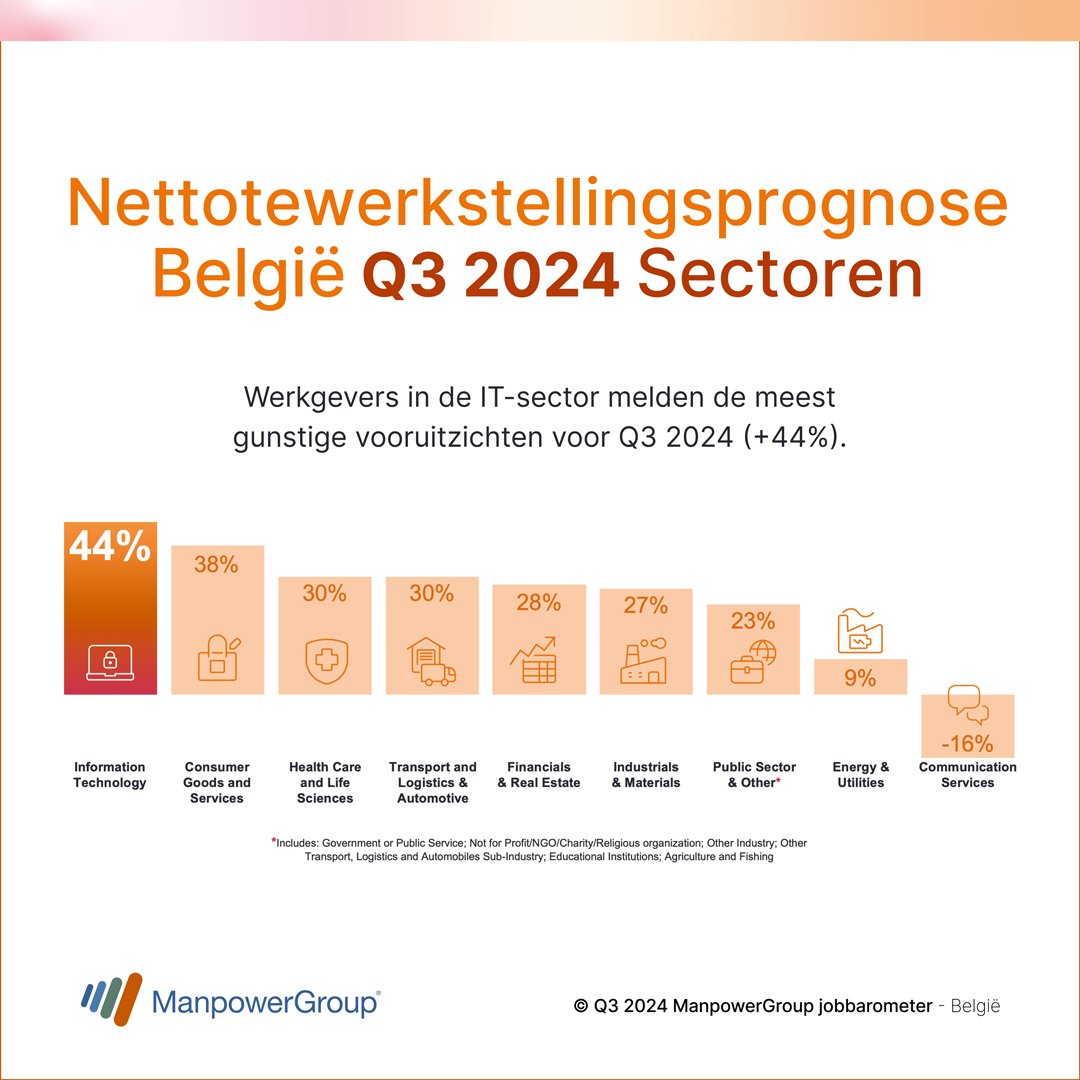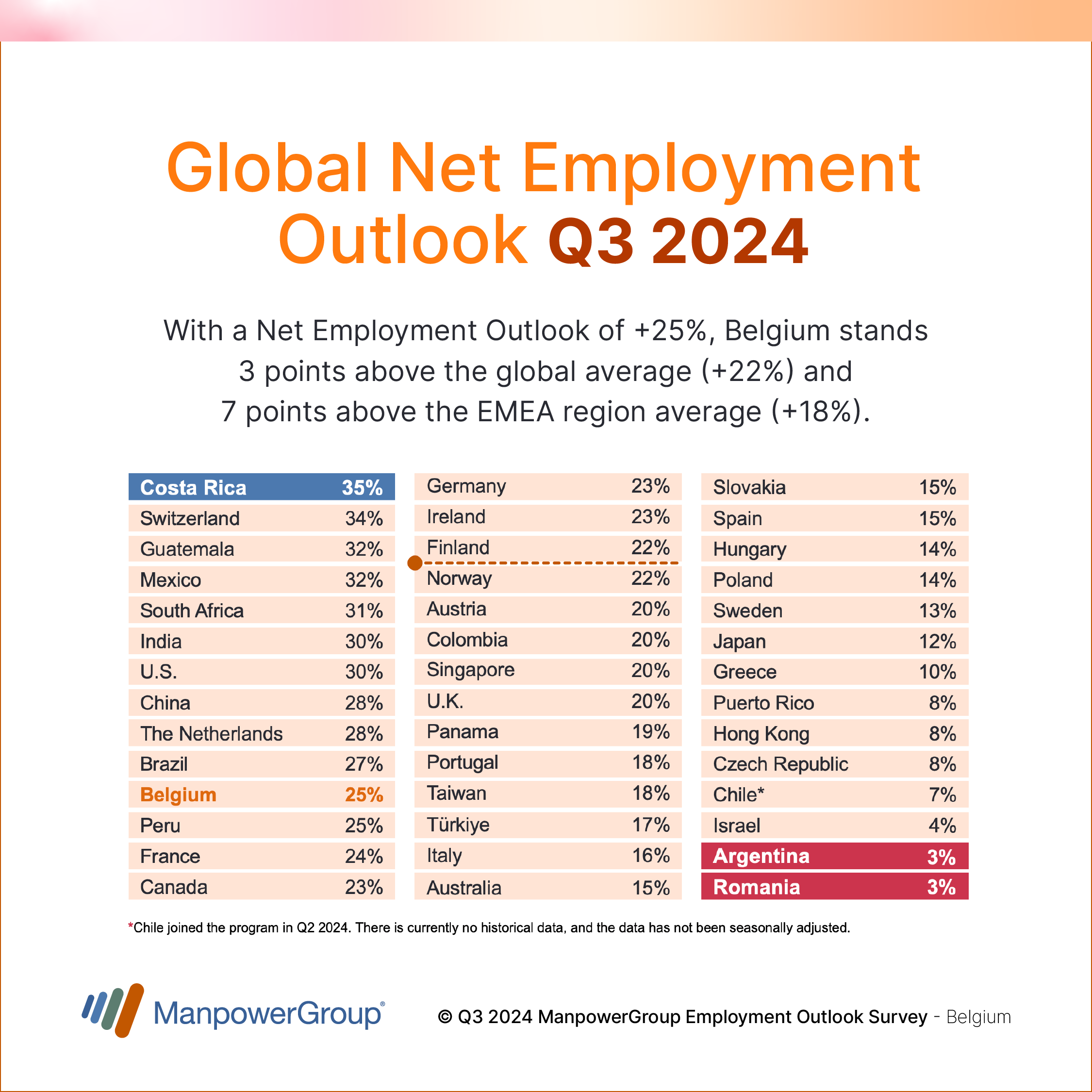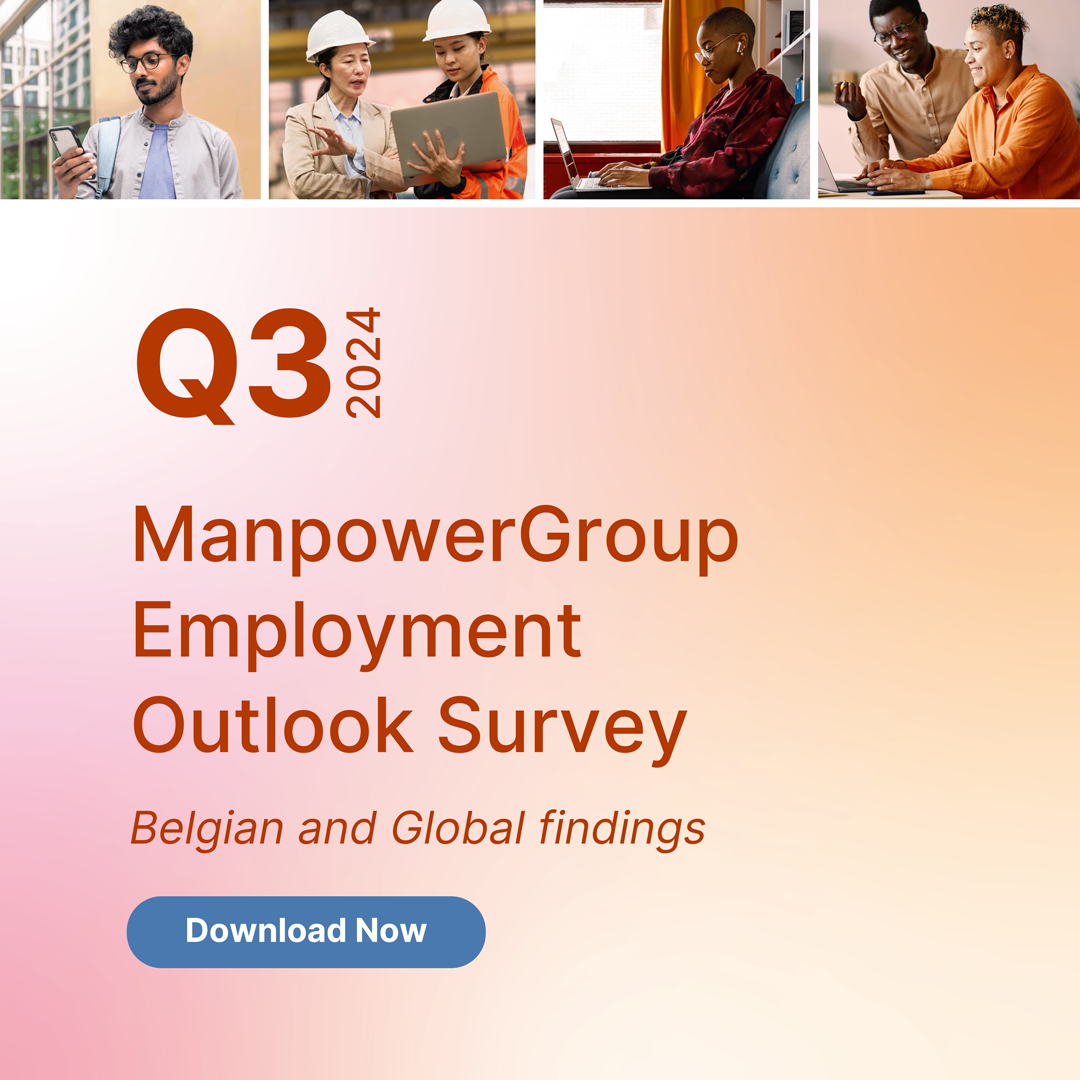Hiring intentions remain strong in Belgium despite uncertain economic environment

7 simple actions to protect the planet!
10 June 2024
ManpowerGroup Named One of the World’s Most Sustainable Companies by TIME Magazine
24 July 2024-
According to the ManpowerGroup Employment Outlook Survey, 45% of surveyed employers anticipate creating jobs during the third quarter, while 20% of them expect layoffs.
-
Belgium’s Net Employment Outlook (+25%) exceeds both the global average (+22%) and the EMEA region average (+18%).
According to the ManpowerGroup Employment Outlook Survey released today, employers plan to offer more job opportunities over the next three months in Belgium. In fact, out of the 525 employers surveyed in April by ManpowerGroup, 45% plan to increase their workforce by the end of September 2024, while 20% anticipate reducing it. 32% of surveyed employers foresee no change. After seasonal adjustment, the Net Employment Outlook(1) – the difference between the percentage of employers anticipating hiring and those expecting workforce reductions – stands at an encouraging +25%. This marks a slight increase of 3 points compared to the previous quarter and 2 points compared to the same period last year.
“The results of our Employment Outlook survey for the third quarter indicate that almost one in two employers surveyed in Belgium plan to increase their workforce by the end of September,“ explains Sébastien Delfosse, Managing Director of ManpowerGroup BeLux. “These relatively high recruitment intentions observed in Belgium (+25%) – above the global average (+22%) and the EMEA region average (+18%) – can be attributed to persistent talent shortages and the fact that many positions remain vacant for long periods due to the difficulty in finding qualified candidates. Economic indicators offer little visibility and prompt employers to remain cautious in their hiring decisions by targeting recruitment and controlling costs. The international results of our survey also show that the labor market remains under pressure and is heavily impacted by the persistent climate of uncertainty.”
Optimism in Brussels and Flanders
Employers in Brussels and Flanders anticipate a slight acceleration in hiring, both compared to the previous quarter and the previous year, with a Net Employment Outlook of +33% and +31% respectively. Conversely, recruitment activity is expected to be more subdued in Wallonia, where the Net Employment Outlook is declining to +15%, its lowest level since the second quarter of 2021.
Strong Demand in the IT Sector
Employers across 8 out of 9 surveyed sectors in Belgium anticipate increasing their workforce by the end of September 2024. Employers in the IT sector report the most favorable forecasts (+44%), with nearly 7 out of 10 surveyed employers planning to increase their workforce by the end of September. “The demand for IT profiles such as developers, cybersecurity experts, data analysts, and cloud specialists, remains very strong. Digital transformation remains a strategic priority for companies of all sizes and across all sectors,” explains Sébastien Delfosse. Hiring intentions are also very favorable in the Consumer Goods/Services/Hospitality/Retail sector (+38%), Transport, Logistics, and Automotive sector (+30%), and Healthcare/Life Sciences sector (+30%). In contrast, forecasts are significantly weaker in the Energy sector (+9%) and negative in the Communication Services/Telecoms sector (-16%). Compared to the previous quarter, the Net Employment Outlook is up in 5 sectors and down in 4 sectors.
In terms of business segments, recruitment activity is expected to be most favorable in the segment of companies employing 50-249 workers (+39%).
Global Labor Market Under Pressure
Analysis of the results of the ManpowerGroup survey of over 40,000 employers worldwide, indicates a decrease in employer confidence compared to last year in 31 out of 42 surveyed countries at global level and in 15 out of 23 countries in the EMEA region (Europe, Middle East, Africa). However, employment prospects remain positive in all surveyed countries. The Net Employment Outlook stands at +22%, the same level as the previous quarter, but down 6 points from the same period last year. Employers in Costa Rica (+35%) and Switzerland (+34%) are the most optimistic, while their counterparts in Argentina and Romania (both at +3%) are the most pessimistic.
With a Net Employment Outlook of +25%, Belgium stands 3 points above the global average (+22%) and 7 points above the EMEA region average (+18%). Our country ranks third out of 22 in Europe, behind Switzerland (+34%) and the Netherlands (+28%), but ahead of France (+24%), Germany (+23%), the United Kingdom (+20%), Italy (+16%), Spain (+15%), Poland (+14%), Sweden (+13%), Greece (10%), the Czech Republic (+8%), and Romania (+3%).
Elsewhere in the world, employment prospects are declining on an annual and quarterly basis in the United States (+30%), India (+30%), and China (+28%), while they remain weak in Japan (+12%).
The results of the next ManpowerGroup Employment Outlook Survey will be released on 10 September 2024 (Quarter 4 2024).
Report : ManpowerGroup Employment Outlook Survey
About the Survey
The ManpowerGroup Employment Outlook Survey for the third quarter of 2024 was conducted in April 2024 by interviewing a representative sample of employers from 40,000 private companies and public organizations in 42 countries and territories around the world (including 525 in Belgium). The aim of the survey is to measure employers’ intentions to increase or decrease the number of employees in their workforce during the next quarter. All survey participants were asked the same question: “How do you anticipate total employment at your location to change in the three months to the end of September 2024 as compared to the current quarter?” It is the only forward-looking survey of its kind, unparalleled in its size, scope, longevity and area of focus. The Survey has been running for 60 years and is one of the most trusted surveys of employment activity in the world. It is considered a highly respected economic indicator.


